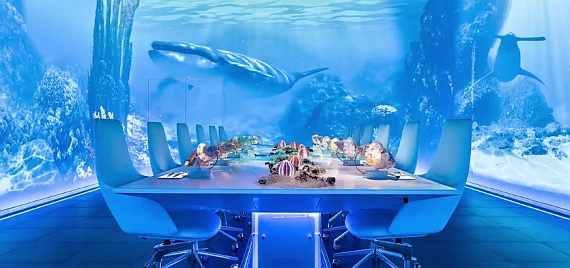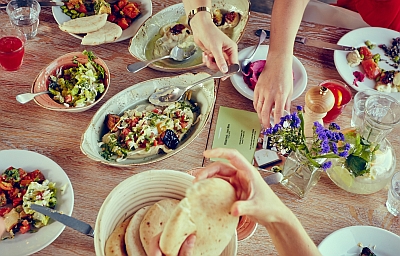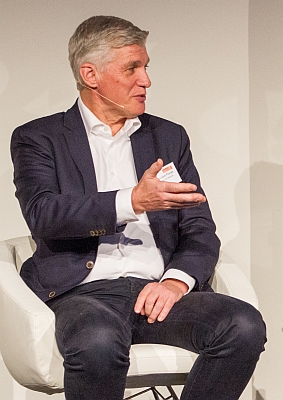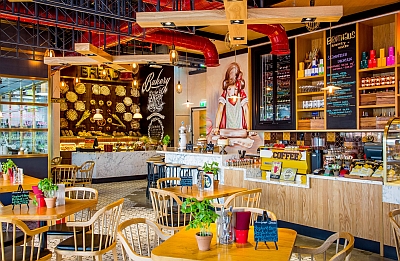ITB Hospitality Day Talk on successful food concepts for hotel chains
 |
| Dining as a culinary-technological performance: Is Sublimotion is the future of Food Design? |
Berlin (March 24, 2017). It doesn't have to be a bad discussion when participants basically agree. This was clear from the podium discussion "From foodies to food design to no food: How hotels deal with the challenges posed by F&B" within the framework of the ITB Hospitality Day on 9 March, 2017. Here, consultants and hotel managers were broadly able to agree that the era of formal and staid hotel restaurants in cities were now a thing of the past. Everything is in flux: The good old Food & Beverage (F&B) manager from yesteryear is today the manager for F&D (Food & Drinks) or better, the man for FD&D – for Food, Drinks and Design.
As trailblazer in this trend, the CEO and founder of 25hours Hotel, Christoph Hoffmann, sat on the podium. His lifestyle hotels came with extraordinary restaurants from the very beginning. Hoffman referred in particular to the restaurant concept "Neni", which caused a furore in the 25hours Berlin. "It was the right moment to open such a place. The daily queues of people hoping to gain a seat proved this." Here, the hotel guest was in the minority making up just 20 percent of customers - it was the locals who were coming to the restaurant en masse.
 |
|
| Christoph Hoffmann: 25hours creates restaurants for the hotel neigbourhood. |
Whether New York or in Asian cities: It's the rule everywhere that hotel restaurants focus on the local community and not on the hotel guest. "The restaurant must also become the local neighbourhood's living room," Hoffmann added. And so the restaurant becomes a meeting place for guests and locals. Ideal for Neni cuisine, a culinary style with Persian, Spanish, Moroccan and Israeli influences, where a menu in the "Balagan" style is considered a perfect example.
A taste of home or a taste of the exotic
25hours didn't invent this itself, that is part of the concept: "We are hoteliers, though can offer a platform for extraordinary restaurateurs because we have the economic ability," Hoffman says. They have 'bought a soul' here. It's a first attempt to think in terms of partnerships, something which has received even greater significance since AccorHotels invested in 25hours.
The "soul" on loan comes from Haya Molcho (62). The wife of the famous mime artist, author and speaker on body language, Samy Molcho, comes from the home cooking arena and established Neni on the Viennese food scene together with her four sons in 2009. "We operate the restaurant ourselves, though in place of a young F&B manager, we have the model Haya Molcho, and are this way able to make the spirit an experience," Hoffmann says. Four Neni restaurants have already been conceived. Just how far the concept can be applied to the Italian, Indian or to far eastern markets was questioned by Hoffmann himself during the discussion.
Jean Georges Ploner, trend expert and founder of the global F&B Heroes network , Frankfurt, sees comparable international developments, even if trends are waves which hit different countries at different times. "Some waves don't land at all," he added.
 |
|
| Restaurant Neni, 25hours Berlin: A family created the concept. |
In the Western world, there is principally an increased interest in food, especially in foodtainment. "A perfect example are cooking shows: You watch more than you eat. But on weekends, we cook. Admittedly often badly, but it's an event," he says, describing the lifestyle of the urban upper class. Another trend is that of the crafts: Craft beer, home-made lemonade and everything which cannot be bought in the supermarket makes gastronomy exciting.
Entertainment and Soul Food
The "sublimotion" clip showing high-tech food preparation, a concept by Spanish star chef Paco Roncero in the Hard Rock Hotel Ibiza, also gave rise to discussion (link to the video: https://vimeo.com/130639117). Here, technology is used to provide the full five-sensory experience for twelve guests every day. Culinary delights in new textures are just one element of this fascinating show though, an experience for which each guest pays EUR 1,500.
Ploner, a consultant, set this in context though: "If I were to set up a Hardrock Hotel on Ibiza though, such a concept would perhaps be reasonable given the horrendous total investment." For 1,000 guests per year, such concepts have little to do with ordinary hotel food. For FD&D, such extremes are necessary: "This includes everything which goes beyond normal basic provision."
 |
|
| Trend expert Jean Ploner: Fine Dining still deserves a chance. |
Urban Denk, Director Culinary Innovation & Management for Deutsche Hospitality (formerly Steigenberger) prefers more silent concepts. "Sublimotion is of course wow. But in day-to-day business it's about being human and wellbeing. That is, personal appeal." For him, the motto applies: Across the global, mentalities are different. In Germany, people finally need to move away from such rigidity.
Though in terms of the culinary offer, the focus is on classics "I'd say soul food. We have reintroduced the club sandwich, for instance. Or when there are green meeting, perhaps you need courage, but you can show what's possible in the season and in the region." The exotic of the nearby was also referred to. 25hours in Hamburg HafenCity, for instance, developed its own "home" (Heimat) concept. Steigenberger carries German hospitality out into the world, for instance with the "German House of Bread" (Deutsches Brothaus) in its hotel in Dubai.
Hoffmann pointed to the limits of "home" (Heimat) and comparable ideas which stand in competition with the local gastronomy scene: "It only works if you can create continuity. A chef de cuisine that leaves after a year won't do it." Where larger hotels are concerned, Denk believes it is sensible to have a second restaurant "out of the box" with the hotel's own staff.
Grab & Go is not bad
Whereas Hoffman sees the downside of hotel restaurants in the fact that hotels are planned from a single mould and the restaurant is simply integrated into that, Ploner disagreed. "If the role of the restaurant is made clear to the architect, then you will also get positive results." Though it is of course difficult to provide a 24-hour restaurant service in the same space.
 |
|
| Urban Denk, Deutsche Hospitality: Quality food can also be healthy. |
For 25hours, a uniform image doesn't come into question. "A seat in a restaurant needs attention: Lots of people pass by, some sad, some drunk and some in love." Light and music are crucial elements here. It makes sense to separate the restaurant off from the hotel also in terms of design. And this is also true for the bar concept. 25hours have its "Dive Bar" where the guest can dive into its atmosphere as well as its drinks for hours. So much proximity to the guest sometimes creates conflict with the hotel policy – for instance when staff joins guests in front of the door for a cigarette.
Contrary themes are part of our times. "Just as extremes drift away from each other in the wider world, so in gastronomy too, trend and countertrend can be successful," Hoffmann is convinced. In principle, Denk doesn't view "Grab & Go" as a catastrophe. "Here too, there is good healthy quality. Bad is only what many young people spend today for rubbish." That the share of system gastronomy is growing was doubted by none of the podium guests. "There will be more of it. It will get better, but it's a shame nonetheless," Hoffmann said and used one of Ploner's counter-arguments: "With Neni, you're multiplying yourself (system gastronomy)."
At the other end of the F&B range, Ploner refused to see "fine dining" at an end. "With 18 seats, it doesn't work, economically, but also because there's no atmosphere. In a single minute, I feel 20 years older there." But in New York City where star restaurants have 200 place settings, this is different. Hoffmann too sees room in Europe for the small personal luxury restaurant: "There are also good old values which we want to keep."
Appropriate training for staff
In further discussions, the focus was on business matters. According to Denk, at Deutsche Hospitality hotels, the costs for staff and goods in ongoing operations are roughly equal. The cost of entertainment is minimal. 25hours also budgets for low entertainment costs, though the lease agreement foresees ten percent of revenue, the costs for the restaurant concept are considerable.
 |
|
| "Deutsches Brothaus" at Steigenberger Dubai. Culinary exotic attracts all citizens. |
Hoffmann: "The greatest share of costs goes on staff. Empathetic employees are crucial for the successful restaurant experience." Whether and how well staff have to be trained depends on the type of restaurant. For Ploner, one month's training is often enough, whilst Denk thinks full professional training is important for the dialogue at eye level between service employee and guest. "Staff pay is also important," Denk knows from international experience. If hoteliers no longer wish to commit themselves to a restaurant, then this isn't an obstacle for Ploner. "If you can't do it well, then I recommend: No food!"
According to a TED survey, 70 percent of those present in the room were of the opinion that hotel restaurants in cities will in future be superior to the options on the small gastronomy scene. Hoffmann: "An individual restauratueur previously had other ways of making money. I can only hope that the little Italian restaurants survive on the corner." On the other side, there are the chain hotels: "We get the hotels ready to go, and can even sub-let. Our hotels earn well. Not least as a result of our innovative F&B." / Fred Fettner
Watch the video of this panel in full length!
Continuative Links:
- March 24, 2017 Guests going crazy ITB Hospitality Day Talk about the new impact of Internet of Things and AI
- March 17, 2017 Tasty, colorful, social, central - ITB Hospitality Day Talk 2017: Hostel experts about the new colorful feeling
To print this article you have to be registered and logged in for newsletter, visitor or subscription.





